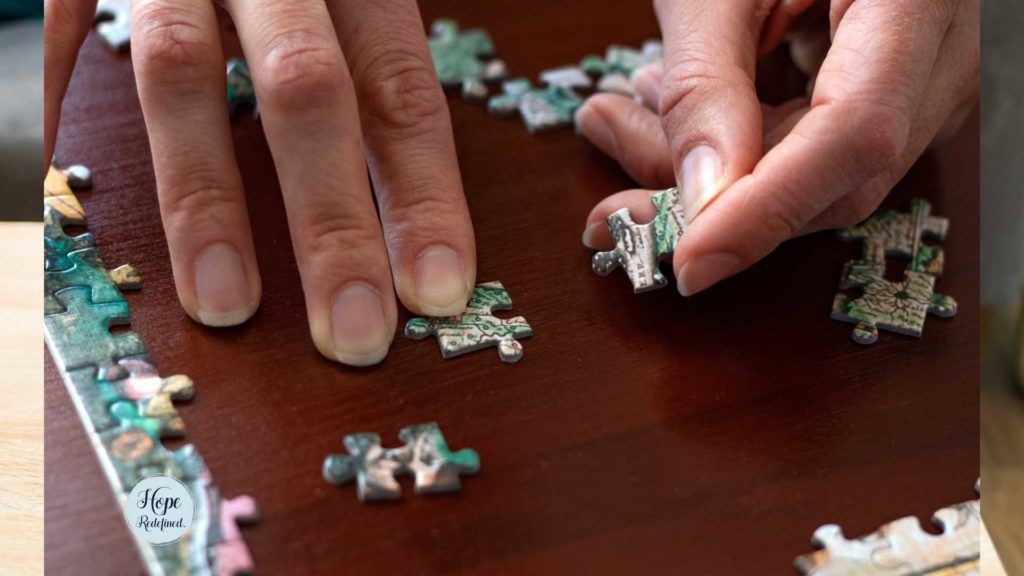Puzzles hadn’t been a recent hobby of mine, but after spying them on the bookstore aisle, I suddenly felt a longing to create something beautiful. As I poured the pieces on the table, I knew exactly how to begin. I picked up a smooth-edged piece and set it to the side – the first step in a long journey of 1000 pieces, but at least I knew how it would end.
The Healing Power of Jigsaw Puzzles
Healing from betrayal trauma is a complex and deeply personal journey. The emotional aftermath left me feeling shattered and uncertain. While therapy and support groups have been essential to my healing, I have also found comfort in quieter, more introspective activities. One such activity is working on jigsaw puzzles. Out of curiosity, I began researching why this activity gave me such joy amid chaos and pain.
Focus and Mindfulness
Betrayal trauma left my mind racing, replaying painful memories and “what ifs.” My thoughts were a pinball machine complete with pinging sounds and metal balls always sliding and bouncing around. Each time I sat down at my jigsaw puzzles that mental energy was gently redirected. As I focused on finding the right pieces and fitting them together, my mind naturally shifted away from distressing thoughts. Focusing on a single task is a form of mindfulness that helps us stay present and calm and the rhythmic nature of puzzle-solving can usher in serenity, allowing us to take a break from emotional turmoil.
A Sense of Control
After experiencing betrayal, it’s common to feel a loss of control over your life and emotions – and I was no exception. Jigsaw puzzles offered me a tangible way to regain a sense of agency. With each piece I placed correctly, I exerted control over something in my world, which, at times, felt completely out of control. This small, yet meaningful act of creating order out of chaos was incredibly empowering, reminding me that I can still make things whole again, one step at a time.
Cognitive Engagement
Healing from trauma isn’t just about addressing emotions; it also involves re-engaging our cognitive abilities. Puzzles stimulate the brain, encouraging problem-solving, spatial reasoning, and memory recall. This mental engagement is crucial for recovering from the cognitive fog that often accompanies trauma. As I worked through a puzzle, I wasn’t just piecing together an image, but also slowly rebuilding my mental resilience and sharpness even though I didn’t realize it.
Emotional Regulation
The emotional rollercoaster of betrayal trauma can be overwhelming. Sometimes I wanted to scream, “Get me off this ride!” I found myself turning to a puzzle during these moments of overwhelm because it offered a quiet, non-verbal way to process my feelings. The simple act of fitting pieces together soothed my frayed nerves and provided a sense of accomplishment. As the picture gradually came together, it reminded me of my own journey toward healing—a reminder that even though things are fragmented now, with time and patience, I could be made whole again.
Building Patience and Resilience
A question we are often asked at Hope Redefined is “How long is this going to take?” Unfortunately, healing from betrayal is not a quick process, and jigsaw puzzles naturally teach patience and resilience. Completing a puzzle requires persistence and a steady hand, even when progress feels slow. Slow puzzle progress mirrors the healing journey, where progress may be gradual and setbacks are common. (Yes, I’m talking to you, puzzle piece that never fits anywhere.) Working through a puzzle helps reinforce the idea that with time, effort, and patience, we can achieve our goal—whether it’s finishing the puzzle or finding peace after trauma.
While jigsaw puzzles may not be a cure-all, they offer a unique and valuable tool for betrayal trauma recovery. Assembling those pieces creates mindfulness, provides a sense of control, and encourages cognitive engagement. Take it from someone who loves pretty puzzles, they can play a quiet, yet powerful, role in our healing journey.
The next time you’re feeling overwhelmed, consider sitting down with a puzzle. Piece by piece, you may find yourself not just completing a picture, but also slowly putting the pieces of your life back together.
Carrying Pieces of Hope,
![]()
Want a puzzle created just for betrayed partners? Check out our Bringing the Pieces Together page to order yours!

